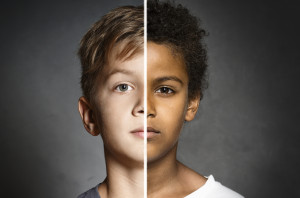
Source: Getty Images
(Content Warning: sexual violence, rape culture, alcohol use)
The first time I formally learned about consent was in grad school.
I was training as a peer sexuality educator, and we did an exercise where we had to decide which activities needed to be discussed with a partner: “Do you need consent to hug someone?” the facilitator asked. “To hold hands? What about to kiss?”
I remember feeling like the whole thing was rather juvenile. I mean, was I really supposed to tell college students that they needed to get permission for any physical contact? Who was going to buy into that?
A decade and a half later, it seems the answer is actually quite a lot of people! In the intervening years, both my understanding of consent and the general cultural conversations about it have come a long way.
But the topic is still a tough one. Partly, that’s because even though many of us are evolving on our understanding of consent, we’re still the products of rape culture.
And messages about consent are typically at odds with that. And partly, that’s because a lot of the questions that come up don’t have easy answers – or they have answers that seem to be out of step with a lot of people’s realities.
Nowhere is this clearer than when it comes to questions about sex and alcohol. Indeed, when I teach about the topic, I regularly field questions like “How drunk is too drunk to consent to sex,” “Is it rape if both people are drunk,” “Can a man consent to sex when he is drunk, but not a woman,” “How can you tell if someone is too drunk to have sex,” and “I got drunk – does that mean when I had sex I was raped?”
There are also complicated cases on college campuses. For example, one at UC San Diego just made the news: After a student was suspended, following the school’s determination that he committed sexual misconduct for having what the school termed “non-consensual sex” with another student when both were drunk, he sued and won a suit against the school on the basis that he had not been given a fair trial by the college.
But whether or not this student felt he had a fair trial, what both parties described of the incident was a clear reminder that many people simply don’t understand consent and the role alcohol plays in it: She said she was too intoxicated to consent; he said he had attended the university’s trainings on alcohol awareness and sexual misconduct and was very aware of the need to make sure that any sex was consensual.
And, of course, there are the generations of sexual assault survivors whose experiences were utterly dismissed because they were drinking. And there are the people who won’t refer to what happened to them as rape since they blame themselves for being intoxicated in the first place.
Digging through this mess, it becomes pretty clear that at every level, we are utterly confused about how alcohol plays into consent.
So with that in mind, here are the five most common questions about drinking and sex, answered.
1. Is Sex Always Nonconsensual When People Have Been Drinking?
The short answer is no. Plenty of people have wanted sex after drinking alcohol – and to pretend otherwise, for an easy way of answering this question, disregards a lot of folks’ real experiences.
But after someone is drinking, it does become harder to convey consent to another person – or to determine that a partner has consented to sex.
That is true for a few reasons:
- Alcohol affects the ability to communicate clearly;
- People may be more likely to willfully disregard messages they’re being sent if they’re drinking;
- Alcohol can give people tunnel vision, which makes them more determined to get that one thing they are focused on; and
- Alcohol can increase aggressiveness, which can be disastrous when it comes to sex.
While alcohol can’t be blamed for causing a crime, as we can see, we also can’t pretend it has no effect on people’s experiences.
Things to Consider
The best rule is that if you or a partner have been drinking, make sure to check in regularly about any sex that you’re having.
Ask things like:
- Do you still want to do this?
- Is this okay?
- Do you need a break?
- Are you having fun?
- What do you want to do next?
Planned Parenthood has some good videos on consent that outline what these conversations can look like.
This will go a long way towards ensuring that you and your partner(s) are on the same page.
2. How Much Do You Need to Drink to Be Unable to Consent?
This is one of those questions that may elicit different answers, depending on where you are or who you ask.
First, there’s the legal side: Most states have laws stating that a person cannot consent to sex if they are incapacitated by drugs or alcohol. But how “incapacitation” is defined will vary.
Cynthia Godsoe is a law professor at Brooklyn Law School who has done a lot of work on the regulation of intimate behavior and gender roles. She explains that in many places, a person is only legally considered incapable of consenting if they’re literally passed out and unconscious as the result of drinking or using drugs.
According to Godsoe, many states also look at the situation differently if someone is determine to be “voluntarily incapacitated” (eg: they drank or took drugs themselves) rather than being drugged by another person, and some even require that the prosecution prove that the defendant knew just how intoxicated the victim was in order to consider sex with that person a crime.
To make matters worse, Godsoe points out that when you combine the difficulty in demonstrating both a lack of consent, and a level of intoxication with, “stereotypes about girls and women who drink and use drugs, prosecutions without unconsciousness, or the inability to walk, [or the presence of] vomiting, or blacking out, will be very difficult.”
However, things are often different on college campuses.
Many schools are taking a new approach to sexual assault following the 2011 publication of something known as the Dear Colleague Letter by the Office for Civil Rights. This letter outlines the fact that under a law known as Title IX, students can formally file complaints if their sexual assault or harassment cases weren’t handled properly by their colleges.
Following this, the Obama administration released a list of colleges that had not complied with Title IX – and as a result, more and more schools started to implement procedures and protocols to address the issue.
But these protocols are not consistent, and both the culture of a school and the interpretation of the law can mean that the stance on alcohol and what it means to be too intoxicated to consent to sex vary greatly between institutions.
According to Godsoe, “Many colleges have found impairment for rape even where the [survivor] actively consented both verbally and via body language.”
And this isn’t only a problem for the administration.
Many students have found themselves struggling to understand the question of how drunk is too drunk to have sex. In an article in Slate about sex and alcohol on campus, Amanda Hess writes, “When I asked a dozen college students around the country to draw their own lines between drunken sex and sexual assault, I got twelve different answers.”
That’s pretty jarring. But given the larger picture, it isn’t really surprising.
What it comes down to is that sex under the influence of alcohol is not automatically nonconsensual, but alcohol sure makes it harder to determine if you have consent. It also makes it harder for you to give consent.
Since the legal standard can vary, or can be confusing, the best way to determine if someone consents to sex after drinking is to check in with the person repeatedly to ensure that they’re capable of communicating their needs. Plus, a check-in the next day is also a really good idea, both in general and also as a way to help facilitate communication around consent.
And just to be clear: If there is ever any doubt, confusion, or supposed mixed message, don’t do it.
Don’t try to talk yourself into thinking that someone is more into sex than they actually are, and don’t try to convince yourself that someone is less drunk than they appear to be. Doing so may be tempting, but it can open the door to a whole host of potential problems, including committing sexual assault.
Things to Consider
While there’s no such thing as consensual sex with a passed out person, that sure isn’t the only measure of a person’s ability to consent to sex. There’s a lot more than the fact of consciousness that needs to be used as a determining benchmark!
It can be wise to ask yourself:
- Can this person communicate clearly?
- Are they coherent?
- Are they sober enough to know fully what is going on?
If you answered no to any of these questions – and even suspect that the last one might be a no – then you should assume that the other person is too drunk to consent to sex.
Also keep in mind that even if something isn’t technically illegal, it might still be unethical – or just a bad idea. Having sex with someone who may only tentatively be saying yes, or who you suspect might later regret what they’re doing, isn’t cool under any circumstances, regardless of what the law says.
So in a similar vein, don’t use legality as your only measuring stick.
Putting this in the context of the the UC San Diego case, the plaintiff said she couldn’t consent since she was “incapacitated by vodka.” Regardless of how the college or the courts ended up viewing the situation, there is no doubt that getting to a point of severe intoxication makes it very hard to give definitive consent.
And as a general principle, sex with someone this drunk is simply a terribly unethical idea, even if it isn’t necessarily breaking the law.
3. What If Someone Said ‘No’ to Sex When Sober, But Then Said ‘Yes’ When Drinking?
People change their minds all the time. And culturally, we tend to understand that this is a basic fact of human nature. But what happens when someone said no to sex when sober and then purported to change their mind after drinking? Is that consent?
There’s no hard-and-fast rule here. But the best advice is to tread with extra caution.
Sure, alcohol lowers inhibitions that a person may have wanted to shed, but oftentimes, those inhibitions are there for pretty good reasons.
Consider how alcohol lowers inhibitions: for example, it reduces self-awareness and the ability to read social cues, impairs cognitive functioning, and allows for instigator pressures to have more of an impact. So using this substance to help us shed our barriers is a little less benign than we often give it credit for.
Your best bet? Wait until the person sobers up – and then check in about whether they really want to have sex or not.
Things to Consider
Ask yourself a few key questions like:
- How much has the person drank since you last checked in?
- Have they ever indicated that they wanted to have sex with you when sober?
Remember, though, that even if a person has said yes to sex when sober, and continues to say yes to sex after drinking, it’s still important to confirm this and to do regular check-ins to make sure that they’re still capable of consenting as more alcohol is consumed.
4. What If They’re in a Relationship?
Obviously, plenty of people in relationships happily have drunk sex without issue.
And in many relationships, consent doesn’t entail an explicit conversation each time. And that’s fine. Navigating sex in a relationship is a really personal process, and one that often evolves over time.
It’s probably a better idea to combine sex and drinking with a person (or people) you’re already involved with. But doing so doesn’t automatically prevent sexual assault, since a relationship doesn’t negate the effects of alcohol.
Romantic or sexual involvement doesn’t ever give you permission to have unwanted sex – and a lot of sexual assaults occur within the context of relationships.
Still, the more sexual history and the more solid a relationship you have, the better you’ll be able to navigate consent after using substances.
Things to Consider
If you want to try to combine sex with alcohol within your relationship, ask yourself:
- Have you ever been drunk together before?
- If so, has your partner demonstrated the ability to make lucid decisions after drinking?
In the UC San Diego case, the two individuals had had oral sex on a few previous occasions, but they had not had vaginal intercourse until the night they got drunk at a party. Introducing a new sex act into an encounter after drinking can complicate an already fraught situation.
But for anyone, a good general rule of thumb is that it’s better to get the hang of sex and to get the hang of drinking with your partner(s) separately before you join the two.
5. What If All People Involved Are Drinking?
Having multiple drunk people doesn’t cancel out the possibility that one or more isn’t consenting to the sex taking place. And being drunk isn’t an excuse to commit a sexual assault. But that doesn’t stop people from trying to use their drunkenness as an excuse.
This was used as a defense at the trial of two Vanderbilt University football players who claimed they couldn’t be responsible for the rape of an unconscious woman because they were just too drunk to know what they were doing.
They lost the case – and rightfully so. But the fact that they, and their lawyers, thought this reasoning had a shot reminds us that the cultural narrative about drinking and sex remains flawed.
So how does the legality work when all involved parties are drinking?
Cynthia Godsoe, the law professor, explains that in situations where all people are drinking, charges are often brought against the person who is determined to have initiated sex, even if they’re also drunk.
And in most cases of sex between a man and a woman, that almost always means against the man.
She says that while “both parties could often be charged, I have never seen a case – and I have looked – where both are… This system also reinforces stereotypes which ultimately are bad for [all] genders — men as inherently aggressive, even ‘“natural rapists,’” and women as passive and weak and unable to hold their liquor.”
For example, Cornell University explains the rationale for this interpretation in the following way:
“The responsibility for misinterpretation when either party has been drinking falls on the initiator of further sexual activity. If the person seeking sex is intoxicated, [they have] a decreased ability to discern the capacity of the other party to give consent. Under Cornell’s rules, the inability to perceive capacity does not excuse the behavior of the person who begins the sexual interaction or tries to take it to another level.”
This is a tricky standard that a lot of people find problematic since there can be cases where all parties feel that they haven’t given consent during different aspects of the same encounter. But pretending it doesn’t happen isn’t going to level the playing field.
Things to Consider
If both or all of you are drinking, it’s really important to understand that whoever initiates sex or tries to introduce a new sex act needs to check in about getting consent. And if you’re the person or people moving things forward, it’s really important that you aren’t so drunk that you can’t do the needed checking in.
Ask yourself: Did I find out if my partner wanted to do xyz before starting to do that?
If you can’t remember or you aren’t sure, ask again and make sure that they can answer clearly before proceeding.
Think of it this way: Just like we don’t give someone a free pass for causing a car accident after drinking, we can’t do so with rape either.
***
Popular culture loves to remind us of that alcohol plays a big role in sex.
If we were to believe the standard script on the matter, we would think that alcohol was a universal driver of sex, the provider of a good excuse for doing something your sober self wouldn’t have, and also the culprit when things get messy. Jamie Foxx’s “Blame it on the Alcohol,” I’m looking at you on all these points!
But this script is off base in so many ways.
It pretends that alcohol is a nefarious substance over which we have no control, and it ignores that fact that alcohol doesn’t automatically prevent people from registering what another person is communicating.
Nor does this narrative offer any alternatives, since under this model, people are utterly at the whim of booze with no agency to direct how situations turn out.
But even if you’re drinking, there are still ways to ensure that the sex you’re having is wanted by all parties.
And that’s a must.
[do_widget id=’text-101′]
Ellen Friedrichs is a Contributing Writer for Everyday Feminism. She’s a health educator, sometimes writer, and mom. She has worked at Manhattan’s Museum of Sex, developed sex education curricula in Mumbai, India, and run HIV prevention programs for at-risk teens in the South Bronx. Currently, Ellen runs a middle and high school health education program and teaches human sexuality at Brooklyn College. More of Ellen’s writing can be found here. Follow her on Twitter @ellenkatef.
Search our 3000+ articles!
Read our articles about:
Our online racial justice training
Used by hundreds of universities, non-profits, and businesses.
Click to learn more
Most Read Articles
- « Previous
- 1
- …
- 30
- 31
- 32



















